Sixteen Years of Civil Justice Reform
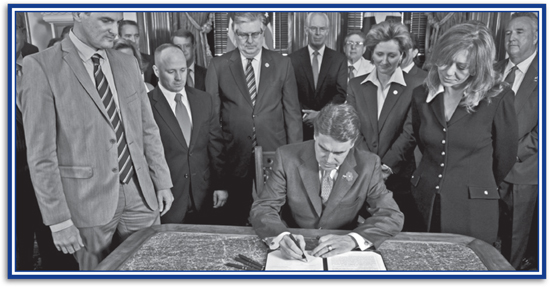
Rick Perry has been a strong advocate for civil justice reform throughout his years as Governor. He provided leadership on the sweeping tort reforms of 2003 (HB 4, the Omnibus Tort Reform Bill), the 2005 reform to eliminate the outrageous abuses in asbestos and silica litigation (SB 15) and, this year, the reform of the Texas Windstorm Insurance Association (HB 3) and the Omnibus Tort Reform Bill (HB 274), which includes mechanisms to discourage meritless lawsuits and to encourage early and fair settlements in litigation. In addition, the Governor has judiciously but assertively used his veto power to prevent harmful legislation from becoming law.
Governor Perry has also significantly improved our justice system through his consistent appointment of outstanding judges. About one-third of Texas judges first arrive on the bench through gubernatorial appointment to fill vacancies. Rick Perry has meticulously vetted his appointees to judicial office to assure that they are men and women of intellect, integrity and judicial conservatism.
The tort reforms of the last sixteen years in Texas have had impressively positive effects on health care, job creation, and respect for the law. TLR and our allies have worked hard for these reforms, but they could not have been accomplished without the commitment of leaders such as Governors Perry and George W. Bush, Lt. Governors David Dewhurst and Bob Bullock, House Speakers Joe Straus and Tom Craddick, and many legislative sponsors and committee chairmen from both political parties whom we have highlighted in The Advocate over the years.
“Loser Pays” Will Help Keep Texas a Winner
by Texas Governor Rick Perry

Our primary goal throughout the 82nd Legislative Session was to maintain – and where possible, improve – a jobs-friendly economic climate that was recently named best in the nation by CEO Magazine for the seventh year in a row.
When it comes to a jobs-friendly climate, we’ve set the bar pretty high, with more than 730,000 private-sector jobs created in the State of Texas between April 2001 and April 2011, according to the Bureau of Labor Statistics. No other state added more than 90,200.
In addition to keeping taxes low and regulation fair and predictable, one of the reasons Texas has prospered is common-sense lawsuit reform. We try to limit over-suing and encourage doctors and small business people to succeed in Texas without fearing frivolous lawsuits. Thanks to the introduction of a “loser pays” component to our legal system, an issue I made a priority this legislative session, I believe we’ve cleared that bar, and set Texas on the path toward greater economic prosperity in the years to come.
Thanks to the introduction of a “loser pays” component to our legal system, an issue I made a priority this legislative session, I believe we’ve cleared that bar, and set Texas on the path toward greater economic prosperity in the years to come.
House Bill (HB) 274, which I proudly signed into law, is another step among several we’ve taken to reform our court system over the last decade, but it’s a significant one.
Under this bill, authored by Rep. Brandon Creighton and sponsored in the Senate by Sen. Joan Huffman, Texas judges will have the ability to dismiss a baseless, frivolous lawsuit immediately. This is the same authority judges enjoy in 42 other states. The party that loses the motion to dismiss must pay the legal fees their opponent incurred arguing the motion.
Trial judges who think a question of law can end a case quickly can ask an appeals court to promptly decide the matter, eliminating the need to play out an entire, costly trial before the higher court gets a chance to weigh in.
The bill also creates a system allowing expedited civil actions in cases involving amounts less than $100,000, which will cut down on court time and costs in smaller cases.
HB 274 encourages timely settlements by penalizing parties who turn down fair settlement offers in hopes of securing a “home run” judgment at trial.
Taken all together, these measures will help keep Texas employers hard at work and growing their businesses, instead of tied up in court, fighting ongoing and often frivolous claims.
This common-sense legal reform will reduce the number of junk lawsuits and quickly throw out the most obviously frivolous cases, clearing the way for swifter justice in more legitimate legal cases. Texas’ new “loser pays” law – which wouldn’t have been possible without the dedication and hard work of countless individu- als and groups like Texans for Lawsuit Reform – will make our state that much more attractive to employers seeking to expand or relocate from countries all over the world, which will likely mean more job opportunities for our families and neighbors.
Tort Reform a Texas Priority
by Lieutenant Governor David Dewhurst

We faced some very difficult challenges in the 82nd Leg- islative Session. Tough choices had to be made on a num- ber of important issues. However, one decision that was not difficult was the commitment we made to further strengthen the tort reforms that have made the Lone Star State a national model.
As I travel throughout Texas, one thing I hear repeatedly from doctors, small-business owners and concerned citi- zens is that they strongly support lawsuit reform.
I believe that all Texans want a civil justice system they can trust to be fair and efficient, where any hardworking man or woman with a legitimate legal grievance can have their day in court. Texans also understand that meritless law- suits can end up killing jobs, costing consumers more money for products and services, and driving some hon- est and hardworking people out of business altogether. That’s why we have taken significant steps over the last few sessions to make lawsuit reform a top priority.
The results speak for themselves. Tort reform has completely transformed our health care system here in Texas. In 2003, we experienced a net exodus of doctors because of frivolous medical malpractice lawsuits, so we passed landmark tort reform legislation. Since the law went into effect, medical malpractice lawsuits have significantly decreased, and we’ve licensed over 24,000 new doctors here in Texas. In 2005, we built on these historic lawsuit reforms by passing asbestos and silica- reform legislation, helping weed-out premature lawsuits and ensuring that those who are truly ill from asbestos get first priority in our courts. This Session, we went a step further, passing Texas Windstorm Insurance Asso- ciation (TWIA) reforms to close loopholes that have allowed some to take advantage of the system – protecting coastal property owners while deterring unwar- ranted lawsuits that penalize all Texans.
Perhaps the crowning lawsuit reform achievement this Session was the passage of House Bill 274, the 2011 Omnibus Tort Reform Bill. Previously, a small claim in Texas was anything under $10,000. That meant that a larger claim would almost always require that attorneys be hired. A claim of $20,000, $30,000 or even $70,000 might not be worth pursuing because attorney fees would take whatever you might recover. Under the reforms, an average person will now be allowed to go into court to pursue a claim of up to $100,000 more quickly and with less discovery. This will save time and money and give average Texans and small-business peo- ple better access to our courts.
The Omnibus Tort Reform Bill takes other steps – the motion to dismiss and interlocutory appeal – that will reduce costs by decreasing the time that may be required in court. Changes in the offer of settlement will create an incentive for both sides to make and accept reasonable settlement offers early in the litigation process, provid- ing another opportunity for saving court costs. The legislation further reduces the number of frivolous lawsuits in our courtrooms and eases the heavy burden on small businesses, which will continue to make Texas a national leader in economic growth and job creation.
I was honored to work with Senator Joan Huffman (R-Southside Place), the Senate sponsor of this legisla- tion, and Senator Robert Duncan (R-Lubbock), Chair- man of the State Affairs Committee, who both did an excellent job in shepherding this important bill through the legislative process. I also want to thank Texans for Lawsuit Reform and their thousands of supporters for their efforts to make sure that Texas remains the gold standard for tort reform and the economic leader for the rest of the nation.
Tort Reform Bill Fights Hidden Tax of Lawsuit Abuse
by House Speaker Joe Strauss
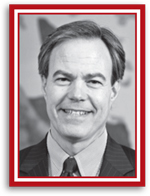
Remember the days when the Wall Street Journal referred to Texas as the “Lawsuit Capital of the World,” and 60 Minutes featured our state in a segment entitled, “Justice for Sale?” Texas had a runaway civil justice system that permitted—and practi- cally encouraged—frivolous lawsuits and outrageous jury awards. “I’ll see you in court” was the common refrain because, in Texas, just about anyone could sue anyone for anything. Legions of doctors were taking early retirement or leaving the state because, with the rising costs of medical malpractice insurance, they couldn’t afford to continue to practice. Businesses were overlooking Texas in favor of other locations they considered to be less risky.
Then, in 1994, a group of concerned citizens began to address these inequities, and establish a long-needed sense of balance and fair play in our state’s civil jus- tice system. During that next session, legislators passed and Texans approved limits on jury awards in medical malpractice suits. They instituted proportional responsibility and “hold harmless” laws for Good Samaritans who render aid to victims of accident or illness. They stopped “venue-shopping” that allowed a lawyer to go from county to county until he found a court inclined to favor his case.
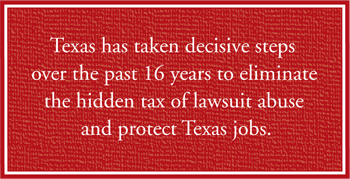
In every session since, the legislature has passed addi- tional lawsuit reform measures that have made Texas a predictable place to do business. The positive results have been tremendous. For one thing, there has been an influx of doctors who now call Texas home. Inter- estingly, New York Mayor Bloomberg was complaining to New York’s state bar association that his state had a “doctor drain.” Apparently, many New York doctors have been migrating to Texas. Mayor Bloomberg cited tort reform and Texas’ lower malpractice premiums as primary reasons why. But whether it is doctors, engi- neering firms, high-tech companies or any other type of industry coming to Texas, we know they are doing so because Texas is a great place for business. People here are free to imagine, free to invent, free to cre- ate – without the constraints of over-regulation, excess taxation and frivolous litigation.
The truth is that lawsuit abuse has acted as a hid- den tax on Texas consumers. It doesn’t show up on a receipt, but it is contained in the price of goods and services. Texas has taken decisive steps over the past 16 years to eliminate the hidden tax of lawsuit abuse and protect Texas jobs.
Inthislegislativesession,youcanbeproudthattheTexas House supported legislation, including House Bill 274, which promotes job growth and long-term investment in Texas and has worked to further an environment that attracts new businesses, and encourages existing busi- nesses to stay here in Texas and expand, creating jobs and opportunity for more of our fellow citizens.
Anti-Barratry Bill Seeks to Deter “Ambulance Chasing”
CSHB 2661 by Rep. Tim Kleinschmidt, R-Lexington. Offer of Settlement Cost-Shifting.
Barratry is legendary in Texas. Experts believe the practice of illegal solicitation of personal injury law- suits, commonly known as “ambulance chasing,” was incubated in certain counties in South Texas and along the Gulf Coast but now has become a problem in other parts of the state as well. Barratry has spawned a wide web of corruption that extends beyond unscrupulous lawyers to include emergency workers and hospi- tals, police dispatchers, funeral homes and, unfortunately, even some law enforcement officials – persons who inform unscrupulous personal injury lawyers about potential clients whenever there is an injury.

Barratry is legendary in Texas. Experts believe the practice of illegal solicitation of personal injury law- suits, commonly known as “ambulance chasing,” was incubated in certain counties in South Texas and along the Gulf Coast but now has become a problem in other parts of the state as well. Barratry has spawned a wide web of corruption that extends beyond unscrupulous lawyers to include emergency workers and hospi- tals, police dispatchers, funeral homes and, unfortunately, even some law enforcement officials – persons who inform unscrupulous personal injury lawyers about potential clients whenever there is an injury.
Barratry victimizes individuals who are illegally solicited at a time of distress and vulnerability, such as immediately follow- ing an accident or the death of a loved one. It also undermines respect and trust in our legal system.
SB 1716, sponsored by Sen. Bob Dun- can (R-Lubbock) and Rep. Allen Fletcher (R-Tomball), with a strong assist by Rep. Connie Scott (R-Corpus Christi), creates the civil penalties that are needed to end this abusive practice.
Bill Edwards, a respected plaintiffs’ attor- ney from Corpus Christi, has been fighting against barratry for over a decade. In testimony before the House Judiciary and Civil Practices Commitee, Edwards stated his belief that civil penalties are necessary in order to stop the practice of barratry. According to Edwards, barratry plays a part in many personal injury cases in South Texas, including the illegal payment of thousands of dollars in up-front cash to clients who sign representation contracts. Edwards also told lawmakers that, although barratry has long been illegal in Texas, it is often difficult to prove. Self- policing by the State Bar Association has also been largely ineffective.
“It is a white collar crime. Recall how hard it’s been for the federal government to arrest people in the mafia, for example, and convict them. These folks operate like the mafia, they operate like drug cartels. The only difference is, while there are large amounts of money changing hands, it’s not as dangerous. You don’t get shot and killed in this business. For law enforcement, it is a difficult case to make,” Edwards said.
SB 1716 will enhance the ability of clients to recover civil damages from case-running lawyers and their collaborators. Sen. Dun- can and Reps. Fletcher and Scott are to be congratulated for their persistence in seeing that this important reform was enacted into law. TLR was pleased to work with them and other interested parties, including the trial bar, to address the insidious practice of barratry.
2011 Tort Reforms: important Changes that Streamline procedures and Reduce Costs
by Alan Waldrop, TLR counsel

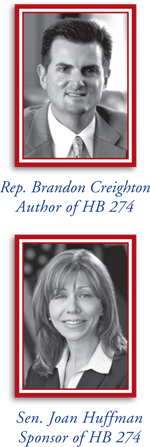
House Bill 274 makes a number of significant changes to our civil justice system designed to streamline procedures and reduce the cost of civil litigation in Texas state courts. Here is a brief, section-by-section summary of this meaningful legislation.
SEC. 1: EARLY DISMISSAL OF CERTAIN ACTIONS
HB 274 instructs the Texas Supreme Court to write new rules of procedure to provide for the “dismissal of causes of action with no basis in law or fact.” This is commonly referred to as a “motion to dismiss” procedure and is part of the procedure in federal courts and 42 other states. This will allow Texas courts to address certain legal challenges to claims without having to go through the summary judgment process or wait until after discovery is completed. This will greatly reduce the cost and time involved in cases that should be dismissed based on a legal question by allowing courts to consider the legal question earlier and dis- miss the case earlier. In addition to instructing the Supreme Court to write rules to implement a motion to dismiss practice, HB 274 also provides that courts shall award costs and reasonable and necessary attor- neys’ fees to the prevailing party whenever a motion to dismiss is granted or denied (this is one of the “loser pays” provisions in HB 274). This will require parties to carefully evaluate both whether to file a motionto dismiss and whether to contest one if it is filed. If the legal question is a close one that could go either way, the summary judgment process will still be available and will pose less risk of exposure to a fee award.
SEC. 2: EXPEDITED CIVIL ACTIONS
HB 274 also instructs the Texas Supreme Court to write new procedural rules to expedite cases in which the amount in dispute is $100,000 or less. While our civil justice system is one of the most open in the world, it can be expensive.
When you have a relatively small claim— and in our civil justice system a claim of, say, $75,000, is a relatively small claim—it can sometimes be prohibitively expensive and time consuming to actually litigate the case through a trial or to final judgment. HB 274 instructs the Supreme Court to write new pro- cedural rules that will provide mechanisms to reduce the time and expense required in smaller cases. HB 274 does not detail what the rules should look like or how they should work, so we do not know what the system for handling smaller cases will be as yet. This will be a significant piece of rulemaking for the Texas Supreme Court to tackle and could dramatically alter the litigation environment in Texas for lawsuits with less than $100,000 in dispute. The statute excludes cases under the Family Code, Tax Code, Chapter 74 of the Civil Practice and Remedies Code (medical liability claims), and the Property Code from this procedure.
SEC. 3: INTERLOCUTORY APPEAL OF CONTROLLING QUESTIONS OF LAW
HB 274 amends the current interlocutory appeal sections of the Government Code to allow the appeal of a control- ling question of law on an interlocutory basis if the trial court and intermediate appellate court agree that the legal question is one that should be answered before incurring the expense of a trial. Our current interlocutory appeal statute allows such an appeal only if the parties agree to it. HB 274 does away with the requirement that the parties agree and replaces it with the requirement that the trial court permit the appeal and the appellate court accept the appeal. This brings Texas procedure in line with fed- eral procedure on this point. This kind of interlocutory appeal will not happen often because both the trial judge and the appellate court have to agree that the appeal should be taken. However, in certain types of litigation where the answer to a pure question of law from an appel- late court or the Supreme Court could avoid potentially years of protracted and expensive litigation, the new pro- cedure will save time and money.
SEC. 4: ALLOCATION OF CERTAIN LITIGATION COSTS
HB 274 also amends our current law relating to certain types of offers of settlement that could be the basis of the award of litigation costs. Under current law, if a defendant invokes the offer of settlement statute, parties may make offers under the statute that could involve the award of litigation costs—including attorneys’ fees—if the offers are turned down. The idea behind the offer of settlement law is that if you turn down a reasonable offer to settle a lawsuit you might have to pay the other side’s litigation costs after the offer because it is your fault that the law- suit kept going and kept costing time and money. Our current offer of settlement statute does not get used very often because it does not impose equal risk on the parties and is complicated in how and when it applies. The cur- rent offer of settlement statute has a rather complicated cap on the amount of litigation costs that can be awarded based on a percentage of how much the plaintiff recovers. HB 274 simplifies this cap and provides that the amount of litigation costs that may be awarded to any party cannot exceed the amount of the plaintiff’s recovery before cost-shifting is applied. While not a radical change in current law relating to offers of settlement, this change could promote additional use of the statute and will encourage earlier and more meaningful settlement discussions in certain types of cases.
SEC. 5: RESPONSIBLE THIRD PARTY PRACTICE AND STATUSES OF LIMITATION
Our current law relating to the designation and potential joinder of responsible third parties in lawsuits has a pro- vision that allows parties in lawsuits to override statutes of limitation. The result is that, in certain circumstances, parties could face claims and have to defend themselves in lawsuits when the claims would otherwise be barred by limitations. HB 274 corrects this problem and makes clear that statutes of limitation do not get overridden by the law relating to responsible third party practice. HB 274 does, however, provide that if the defendant fails to disclose to a plaintiff the existence of a responsible third party in a timely manner and causes a plaintiff to lose the opportunity to join the third party in the lawsuit because limitations has run, the defendant will not get the benefit of designating the third party as a respon- sible third party. This places the burdens on the correct parties—those in the lawsuit—and does not result in a nonparty facing revived claims that otherwise would have been barred by limitations
Perry’s Leadership Seen In Passage of Omnibus Tort Reform Bill & TWIA Reforms
Governor Rick Perry’s leadership was critical to the passage of HB 274, the Omnibus Tort Reform Bill of 2011, and the Texas Windstorm Insurance Association Reform Bill. The Governor is rightly known as the strongest pro-tort reform governor in the nation.
Governor Perry’s commitment to lawsuit reform and a fair and predictable civil justice system has been strong throughout his time in public office:
» Perry backed reforms in 1999 to prevent the repetition of abuses that allowed former Texas Attorney General Dan Morales, who served time in federal prison, to award $3 billion in fees to a few trial lawyers.
» Perry provided leadership in the passage of the comprehensive 2003 reforms that curbed abuses in numerous areas of litigation, including medical liability and class actions, and made improvements in other areas of the law, including venue and appeals bonds.
» Medical liability reforms passed in 2003 continue to bring new doctors to Texas, assuring that Texans have access to doctors and health care in communities across the state. Institutional savings from medical liability insurance costs totals $100 million annually. This has been invested in a wide range of new health programs, from diabetes prevention clinics to electronic records
» Perry worked for the landmark reforms in 2005 that curtailed abusive asbestos and silica lawsuits, which the Wall Street Journal called “The Great Asbestos Scam,” and which a federal judge referred to as “lawsuits manufactured for money.”
» Perry supported a critical lawsuit reform in 2007 that closed a loophole in state venue law that had created an avalanche of abusive lawsuits against the dredging industry; those lawsuits were threatening Texas’ critical maritime industry.
» Perry consistently appoints exemplary judges to Texas courts who are honest, competent and conservative. Lawsuit reform encourages business growth and expan- sion, strengthens productivity and increases innovation. The lawsuit reforms that Gov. Perry has championed have played a key role in job growth and boosting the state’s overall economy. Recent economic news continues to demonstrate that the Texas economy is the strongest in the nation.
» In June, USA Today reported that 262,000 new jobs had been created in Texas, “or half the USA’s 562,000 payroll gains.” Payroll growth was 2.9% in Texas while the national growth rate remained at 0.4%.
» Texas cities dominated the Forbes Rankings of Best Cities for Jobs in 2010.
» CEO Magazine ranked Texas the best state in which to do business for seven years in a row.
» Texas has won Site Selection Magazine’s Governor’s Cup for 2010, which is awarded annually to the state with the most new and expanded corporate facilities announced over the year.
» Texas has been ranked the top exporting state in 2010 for the ninth year in a row, according to data released by the U.S. Department of Commerce, signaling Texas’ ongoing role in leading the nation toward economic recovery.
» Newsweek ranked four Texas cities – Austin, Dallas, San Antonio and Houston – in its list of 10 cities best situated for economic recovery, describing Texas as “the No. 1 destination for job-seeking Americans …”
Legislative Changes to TWIA will Benefit All Texans
by Mike Hull, TLR counsel

WHAT IS “TWIA”
TWIA is the Texas Windstorm Insurance Association, a quasi-governmental body that provides coverage for wind and hail damage to residents of thirteen counties on the Texas coastline (called “tier one counties”). A handful of Texas trial lawyers exploited TWIA following property losses caused by Hurricanes Katrina, Dolly and Ike, gaming the process to their economic benefit. Millions of dollars were paid in attorneys’ fees to those lawyers for settling claims with TWIA, generally after little or no work was done by those attorneys in preparing the cases for trial. Five attorneys handling a class action against TWIA were paid over $10 million dollars to settle the lawsuit despite conducting no discovery at all in the class action.

The Legislature was faced with the delicate balance of ensuring that future claims will be paid promptly and reasonably while also addressing the pitfalls that allowed trial lawyers to make millions of dollars from TWIA, which has contributed to the agency’s current insolvency.
HB 3, the TWIA Reform Bill that passed in the recent legislative special session, was authored by Representative John Smithee (R-Amarillo) and sponsored by Senator John Carona (R-Dallas). It contains many important provisions designed to improve TWIA’s claims resolution process, the methods by which TWIA is funded, and TWIA’s governance procedures. Chairman Smithee and Chair- man Carona, with strong assistance from Governor Rick Perry, Lt. Governor David Dewhurst and Speaker Joe Straus, passed a balanced and effective statute that will help restore financial solvency to TWIA, provide timely and fair remedies to policyholders, prevent trial lawyers from imposing excessive costs on a governmen- tal body, and improve the governance and effectiveness of TWIA.
HB 3 ESTABLISHED FAIR AND REALISTIC TIMELINES
A TWIA policyholder must file a claim under the policy not later than the first anniversary date on which the damage to the property was done, which may be extended for a period not exceeding 180 days by the commissioner of the Texas Department of Insurance (“TDI”) for a claimant showing good cause. The old law had no deadline for filing a claim.
Not later than the 60th day after the date TWIA receives the necessary information to make a determination on the claim, the association must provide the claimant with notice that the association has: (i) accepted coverage for the claim in full, (ii) accepted coverage in part and rejected it in part, or (iii) denied coverage in full. If a policyholder disputes the amount of loss that TWIA will pay for a covered claim ,the policyholder may demand an appraisal not later than the 60th day after the claimant has received notice from TWIA stating the amount the association will pay. The claimant may get a 30 day extension to demand appraisal upon showing good cause.
Building on Texas’ Lawsuit Reforms: passing HB 274 in the 82nd Legislative Session
by Sherry Sylvester, Senior Communications Advisor


When Gov. Rick Perry signed the Omnibus Tort Reform Bill on May 30th, it marked the end of over a year of work for him, Lt. Gov. David Dewhurst, Speaker Joe Straus and a host of elected officials who are committed to strengthening the tort reforms that are bolstering the state’s economy. Though bitterly opposed by the Texas Trial Law- yers Association until the last minutes of negotiation in the halls of the Texas Senate, the bill emerged as the most significant legislation impacting the Texas civil justice system since the asbestos-silica legislation in 2005 and the medical liability reforms of 2003.
TLR conducted extensive research and analysis of every aspect of the Omnibus Tort Reform Bill and was actively involved in advocating the reforms as they worked their way through the legislative process.
TLR Chairman, Richard W. Weekley, was on hand at the Greater Houston Partnership in Houston on March 14, when Gov. Perry stood alongside the sponsors of the bill, Sen. Joan Huffman (R-Southside Place) and Rep. Brandon Creighton (R-Conroe).
In announcing his intention to make HB 274 a priority in the 82nd Legislature, Gov. Perry said, “passing loser pays will put Texas in a position that no other state in the nation can hold up and say, if you come to the State of Texas you will not be frivolously sued.”
Rep. Creighton stressed that the bill was a priority for him because of its positive impact on small businesses. “Economists agree that just under half of the frivolous lawsuits filed are targeted against small businesses. Small businesses are the heartbeat of Texas because Texas families work hard to keep those small businesses’ doors open on a daily basis.” Creighton said.
Sen. Huffman, a former prosecutor and criminal district court judge, said that for her, HB 274 was about fairness: “In the criminal justice system, it’s all about fairness. We worry about being fair, as we should, and I think the civil justice system should be the same. It should be about fairness.”
As with medical liability reforms in 2003, the Texas House of Representatives took the lead in passing this important Omnibus Tort Reform Bill. Besides Speaker Straus, Rep. Creighton and House Judi- ciary and Civil Jurisprudence Chairman Jim Jackson (R-Carrollton), several other Members had critical roles in the development and passage of HB 274, including Representatives Tim Kleinschmidt (R-Lexington) and Kenneth Sheets (R-Dallas), who were active in crafting and advocating the offer of settlement provision. Rep. Tryon Lewis (R-Odessa), who served as a state district judge for 21 years, crafted and advocated the responsible third party provision of the bill. Representatives Jerry Mad- den (R-Richardson), Sarah Davis (R-West University Place), and Lewis served on the Subcommittee handling HB 274. Committee Members Beverly Woolley (R-Houston), Dwayne Bohac (R-Houston) and Connie Scott (R-Corpus Christi), consistently supported the bill. Rep. Senfronia Thompson (D-Houston), ranking Democratic Member of the Committee, was constructive in the process.
Calendars Chairman Todd Hunter (R-Corpus Christi), a long-time tort reform advocate, played a crucial role in getting HB 274 to the floor of the House. Rep. Jose Aliseda (R-Beeville) and Rep. Ste- fani Carter (R-Dallas) were also helpful in preparing for and engaging in the floor debate of HB 274.
The floor debate in the House was often bitter as sev- eral state representatives, who are also trial lawyers, worked tirelessly to kill the bill, using procedural tac- tics and delaying strategies. Speaker Straus and his leadership team were careful to make sure that those efforts by the bill’s opponents did not succeed. When HB 274 was finally voted on, the tally was 96 to 49, a clear sign of the depth of support for tort reform in the Texas House of Representatives.

Lt. Gov. David Dewhurst and Sen. Huffman worked hard to achieve success in the Senate through nego- tiations between the stakeholders. State Affairs Chair- man Robert Duncan (R-Lubbock) was active in the negotiations, as he had been in previous sessions on HB 4 (the Omnibus Tort Reform Bill in 2003) andSB 15 (the asbestos litigation bill in 2005). The leg- islation in its final form significantly improves Texas jurisprudence and received the votes of all 31 Texas senators.
On May 30th, Governor Perry’s office was packed with tort reform supporters from around the state to celebrate the Governor’s signing of HB 274 into law. TLR Chairman Richard W. Weekley said at the signing:
“Gov. Rick Perry’s 2011 Omnibus Tort Reform Act brings the most significant lawsuit reforms to the Texas civil justice system since the asbestos litig tion reforms of 2005, which substantially increased job creation and business expansion, and the Omnibus Tort Reform Bill of 2003, including the medical liability reforms, which ended the doctor shortage and expanded access to health care throughout the state. The legislation the Governor is signing into law today will discourage meritless or abusive lawsuits by imposing a risk on those who pursue them. It will expedite the movement of cases through our courts, strengthen the statutes of limitation and provide incentives for fair and early settlements. These reforms, like all the tort reforms Gov. Perry has cha pioned, will strengthen the state’s economy, spur job growth and help assure that our civil courts are ba anced and fair for all.”
Other business leaders also applauded the pas- sage of HB 274: “Texas Association of Business applauds Gov. Rick Perry for his leadership to ensure that Texas’ courts are balanced and fair to all.” TAB President and CEO Bill Hammond said. “HB 274, considered a top priority by Gov. Perry, expedites legitimate claims while also putting a stop to frivo- lous claims early in the process.”
“Governor Perry’s loser pays legislation protects businesses and helps us grow jobs and paychecks in Houston,” Jeff Moseley, President and CEO of the Greater Houston Partnership, said. “The Greater Houston Partnership was an early supporter of the bill, and we are enthusiastic about how this law will make Texas even more business friendly. GHP applauds Sen. Joan Huffman and Rep. Brandon Creighton for their leadership on this legislation.”
“The procedural protections in HB 274 will further cut the costs of litigation, allow quicker access to the courts, and create a more efficient judicial system,” Ryan Brannan, an economic freedom policy analyst with the Texas Public Policy Foundation said. “In particular, the rulemaking authority given to the Supreme Court to allow a motion to dismiss for fil- ing a frivolous lawsuit – something already done in federal courts – would be a great step forward.”
“A fair and efficient legal system is an important consid- eration when manufacturers look for locations to setup shop and invest their resources,” Luke Bellsnyder, Executive Director of the Texas Association of Manu- facturers, said. “House Bill 274 further improves the Texas legal system, strengthening Texas’ reputation as a great place to do business.”
“The implementation of a ‘loser pays’ system has been one of the National Federation of Independent Business/Texas’ key priorities for the 82nd Legislative Ses- sion,” NFIB Texas Executive Director Will Newton said. “Small businesses sometimes find themselves in the position of having to settle a frivolous claim rather than continuing to fight the suit because it is less expensive. They should be reinvesting their finan- cial resources back into their businesses rather than defending themselves from needless lawsuits.”
“Associated Builders and Contractors of Texas selected this issue as one of our highest priorities for this Leg- islature,” Jon Fisher, President of ABC Texas, said.”We applaud Gov. Perry’s leadership and thank Sen. Huffman and Rep. Creighton for authoring this leg- islation which continues to improve the civil justice climate in Texas.” HB 274 became effective on September 1, 2011.
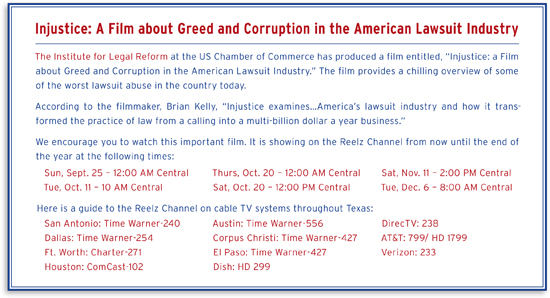
TLR Salutes Texas State Rep. Jim Jackson
State Rep. Jim Jackson (R-Carrollton), who served as Chairman of the Judiciary and Civil Practices Committee in the 2011 legislative session, announced his retirement from the Texas House earlier this summer. While he will serve out his current term, he will not run for re-election in 2012.
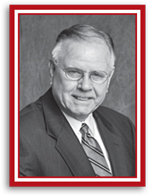
TLR President Dick Trabulsi worked closely with Chairman Jackson and commented on his retirement: “Jim’s style of leadership, which encompasses civility, wit and a genuine respect for all reasonable points of view, has made him a role model for many in the Legislature and won him the respect of all those who interact with him. His hard work and principled commitment to good public policy have made a last- ing impact on our State. We in TLR are honored to have worked with Jim and we are deeply grateful to him for the important contributions he has made to the Texas civil justice system.”
Chairman Jackson was first elected to the Texas House in 2004. He received TLR’s Civil Justice Leadership Award in 2009 at a special ceremony in Dallas.
Chairman Jackson was appointed Texas Chairman of the American Legislative Exchange Council in 2007 and has received dozens of other public service awards from groups in his community and statewide, includ- ing the Texas Association of Business Fighter for Free Enterprise award, the Texans for Fiscal Responsibility Taxpayer Hero award and the Americans for Prosper- ity Defender of the American Dream award.
Before he was elected to the Texas House, Chairman Jackson served as a Dallas County Commissioner. In 2008, the Dallas County Employee Health Center was renamed in his honor. Jim and his lovely wife Sue have two married chil- dren and three grandchildren whom they adore. Sue Jackson is a force in her own right in the Capitol and both Jim and Sue will be sorely missed. All of us in TLR wish them the happiness and contentment that they have fully earned and richly deserve.
On a showing of good cause, the commissioner may extend any deadline, but the extension of deadlines may not exceed 120 days in the aggregate. “Good cause” includes military deployment.
APPRAISAL
If a policyholder demands an appraisal on the amount of loss, then: (i) the appraisal must be conducted as pro- vided by the policy, (ii) the claimant and the association share the costs in equal shares, (iii) each party chooses its own appraiser, (iv) those two appraisers can choose a third appraiser as umpire, (iv) if they fail to agree, the TDI commissioner can choose the umpire from a roster of qualified umpires maintained by TDI. The appraisal process is generally binding on the parties.
ALTERNATIVE DISPUTE RESOLUTION
If a policyholder provides TWIA with notice of intent to bring a claim against the association (which is required prior to bringing a lawsuit), TWIA may require the claim- ant to submit to alternative dispute resolution (“ADR”) by mediation or moderated settlement conference. The TDI commissioner shall designate that formal rules of evidence shall not apply to the proceedings, so that a poli- cyholder may choose whether or not to be represented by an attorney.
LAWSUITS AGAINST TWIA
If a claimant is not satisfied after completion of the ADR or if the ADR is not completed within 60 days, the claimant may file a lawsuit in the county in which the loss occurred.
A lawsuit shall be presided over by a judge appointed by the multi-district litigation panel. That panel must choose an active judge who is a resident of the county of loss or a first or second tier coastal county that is adjacent to the county of loss.
In an lawsuit against TWIA, the claimant may be made whole by recovering: (i) the covered loss payable under the terms of the policy less any amount of the loss previ- ously paid by the association, (ii) prejudgment interest from the first day after the date on which TWIA should have paid the amount owing to the claimant, and (iii) court costs and reasonable and necessary attorney’s fees. A claimant may also recover consequential damages under the common law.
If a claimant proves by clear and convincing evidence that TWIA mishandled a claim by engaging in intentional conduct, in violation of certain requirements of the bill, then a claimant may also recover double damages, which is an amount equal to claimant’s covered loss and any consequential damages.
ARBITRATION
A policyholder may elect to purchase a binding arbitration endorsement and may receive a premium discount. A person purchasing the endorsement must arbitrate a dispute involving an act, ruling, or decision of the asso- ciation relating to the payment of, the amount of, or the denial of the claim.
EXPERT PANEL ON WIND DAMAGE
A substantial issue in the TWIA litigation over Hur- ricane Ike claims concerned the extent to which dam- age was caused by wind (a covered loss) versus damage caused by water (a non-covered loss). The new law provides that the TDI commissioner shall appoint a panel of experts to develop scientifically-based recommenda- tions concerning the extent to which a loss to insurable property was incurred as a result of wind, waves, tidal surges, or rising water.
Members of the panel must have professional expertise in the geography and meteorology of the Texas seacoast, as well as the scientific basis for determining the extent to which damage to property was caused by water.
After consideration of the recommendations made by the panel, the commissioner shall publish guidelines that TWIA must use to settle claims.
TRANSPARENCY, CODES OF CONDUCT AND OVERSIGHT
The new law makes a number of changes to TWIA to improve how it is governed and the transparency by which it is governed. The new law:
» Requires each TWIA policy to contain a conspicu- ous notice concerning the resolution of disputes, including: (i) the processes and deadlines for appraisal and alternative dispute resolution, (ii) the binding effect of appraisal, and (iii) the require- ments of causation and coverage disputes, including judicial relief.
» Requires TDI to establish an ombudsman program, the purpose of which is to provide useful informa- tion to the association’s policyholders and potential policyholders.
» Establishes standards of conduct for the direc- tors and employees of TWIA to prevent wrongful conduct, including undue influence, breaches of confidentiality, fraud and bribery.
» Establishes conflicts of interest rules for the associa- tion’s directors and employees.
» Requires the association to post notice of meetings of the board of directors on the websites of TWIA and TDI not later than the seventh day before the date of the meeting.
» Allows the TDI commissioner (or the commis- sioner’s designated representative) to attend a board of directors’ meeting of the association.
» TWIA must broadcast live on the association’s website all meetings of the board of directors (other than closed meetings) and shall maintain an archive of the meetings on its website.
» Imposes duties on the directors to establish a code of conduct and performance standards for TWIA’s employees and independent contractors and sets forth procedures to monitor their adher- ence to the standards.
» Explicitly states that TWIA is subject to statutes on open meetings and open records.
» Directs the association to develop a simplified renewal process that allows for the acceptance of an application for renewal coverage, and payment of premiums, from a property and casualty agent or an insured person.
» Gives TDI exclusive authority over the appoint- ment and oversight of qualified inspectors. Persons seeking appointment as qualified inspectors must possess the knowledge, understanding, and profes- sional competence to perform windstorm inspec- tions. The TDI commissioner may ex parte enter emergency cease and desist orders against a qualified inspector (or a person acting as one) if the commis- sioner believes such inspector or person to be acting wrongfully or fraudulently.
» Makes TWIA subject to audit by the state auditor. HB 3 requires the auditor to conduct a random audit of claim files concerning claims related to a particular storm to determine whether TWIA is adequately and properly documenting claims decisions in each claim file and to ensure that each claim is being handled appropriately, including being handled in accordance with the terms of the policy under which the claim is filed.
» Requires TWIA to post on its website compensation that exceeds $100,000 to any vendor, independent contractor, or employee.
DISCOUNTS, CREDITS, AND ALTERNATIVE CERTIFICATION
HB 3 recognizes that homes built according to the build- ing codes are less likely to sustain wind damage. The new law encourages TWIA policyholders to remodel homes according to building codes. The TDI commissioner may by rule provide for a discount of or a credit against an assessed surcharge in instances in which a policyholder demonstrates that a noncompliant structure was con- structed with at least one structural building component that complies with the building code standards set forth in the association’s plan of operation.
The TWIA Reform Bill will help restore financial solvency to TWIA, provide timely and fair remedies to policyholders, prevent trial lawyers from imposing excessive costs on a governmental body, and improve the governance and effectiveness of TWIA.
A person with an insurable interest in a residential struc- ture may obtain TWIA insurance coverage for that struc- ture without obtaining a certificate of compliance if at least one qualifying structural building component of the structure meets certain requirements set forth in appli- cable building code standards, the association’s plan of operation, and TDI rules.
For persons who get an alternative certification for a resi- dential structure (see preceding paragraph), TWIA shall have an actuarially sound rate, credit or surcharge that reflects the risks presented by the structure; the rate, credit or surcharge may vary based on the number of qualifying structural building components included in the structure. Any surcharge under this provision is limited.
TWIA may offer an insured an actuarially justified premium discount on a policy if: (i) the construc- tion, remodeling, enlargement, repair of, or addition to, insurable property exceeds applicable building code standards, or (ii) the person elects to purchase a binding arbitration endorsement.
FUNDING
The new law recognizes that TWIA has no plan and no funding mechanism to make aggregate claims pay- ments in excess of about $3 billion dollars. HB 3 begins to address these issues by requiring TWIA to submit to the legislature an annual report containing a catastrophe plan for informational purposes. The plan will include a description of how losses under policies will be paid, and how claims will be administered and adjusted.
HB 3 also permits TWIA to issue pre-event bonds as well as post-event bonds in a way that should make the asso- ciation’s bonds more acceptable to bond purchasers and lower the interest rate paid on the bonds.
Finally, if the association does not purchase reinsurance, the board shall submit a report containing an actuarially sound plan for paying losses in the event of a catastro- phe with estimated damages of $2.5 billion or more. The report is for informational purposes only.

